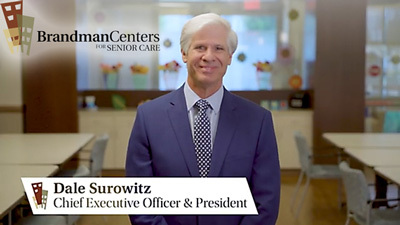Brandman Centers for Senior Care Playing a Pivotal Role for Seniors During the Pandemic and Beyond


Brandman Centers for Senior Care Playing a Pivotal Role for Seniors During the Pandemic and Beyond
From the earliest days of the pandemic, the Brandman Centers for Senior Care (BCSC), a Program of All-Inclusive Care for the Elderly (PACE), distinguished itself as one of the jewels in the crown of the Los Angeles Jewish Home. While many other, similar programs across the country closed their doors as COVID-19 reached crisis proportions, BCSC took all of the extra safety steps required to stay open, ensuring vulnerable seniors had ongoing access to the center, as well as critical care through the clinic, rehabilitation services and much more.

"The program is called 'all-inclusive care,' and it really is," notes Susie Fishenfeld, BCSC executive director. "Despite the obstacles presented by COVID, we were able to get people medication and supplies at home; to bring them into our center—of course, following distancing and safety protocols—to keep them socializing; and to prepare stimulating, energizing activities to help them stay vibrant. What a difference it made for our seniors, their families, and caregivers during this difficult time!"
Now in its ninth year, BCSC provides adult day healthcare and a full suite of healthcare services that enable seniors to live independently in the comfort of their own homes even when health challenges make them eligible for nursing home care. It has proven to be a winning formula that continues to garner praise from the seniors being served.
In fact, the results are just in from a comprehensive customer satisfaction survey, conducted by noted social science research organization Vital Research, showing overall satisfaction with BCSC is at an impressive 90 percent. From meals to medical care, social workers to healthcare specialists, and transportation to activities, BCSC participants praised the program's offerings and expressed appreciation for the support they receive.
"Our goal is to make seniors feel safe and well cared-for, and I am deeply gratified we have been able to deliver what they need throughout the pandemic," Susie says. "Whether we have been doing onsite therapy or using telehealth to reach seniors who haven't been able to come to the center, we have made it our mission to reach as many people in our community as possible."
In recognition of its ongoing success, this year BCSC's PACE program was honored with the prestigious Organization of the Year award from the California National Association of Social Workers. The recognition, Susie says, is testament to BCSC's talented and dedicated team.
"Throughout all of the COVID surges, and regulatory restrictions, our staff were here at BCSC, demonstrating their commitment to our participants and their families and their belief that our seniors deserve the very best care possible," she says.
Senior populations have been on the rise nationwide for years, and with demand for BCSC services continuing to spike, the Jewish Home is expanding the program—which has been based in the San Fernando Valley—to LA's Westside. The newest BCSC facility will be located in the heart of West LA's Pico-Robertson neighborhood (9800 West Pico Blvd.) and is set to open later this summer.
"We can't wait to bring our award-winning service to the Westside, as we seek to meet the needs of seniors across West LA and the surrounding areas of Los Angeles," Susie says. "We're busy recruiting staff, completing construction, and preparing to welcome our first participants, hopefully by July 1."
To watch our new BCSC video and learn more about the PACE program, click here. For information about program participation or employment opportunities, contact us at (818) 774-8444.